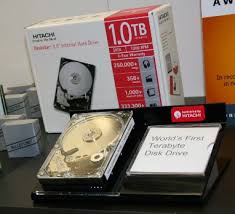The advent of the
Terabyte hard drive has many techies drooling about the endless possibilities in terms of the amount of data they can hold. Though still quite expensive, there are certain situations where such a huge drive would be advantageous such as with use in video and animation which tends to be quite hard drive space hungry.
Bigger is better, right? Not always, for consider this, you may have a terabyte of data stored into a compact drive but what would happen to that very terabyte of information should your hard drive suddenly fail? Having several drives is still better due to the redundancy that exists, and is the reason why servers have several hard rives in a
RAID configuration that has the ability to either have several hard drives having the same information, ready for hot swapping should the primary hard drive fail without much problems.
The lure of large drives is true and with their prices set to drop in the coming years, they would only increase in terms of size but the dangers rise along with that. A
100GB hard drive failing may have all your files and other information on your desktop but the terabyte hard drive you have installed in your home network may mean you and the rest of your family lose all of your iles and information, simultaneously.

